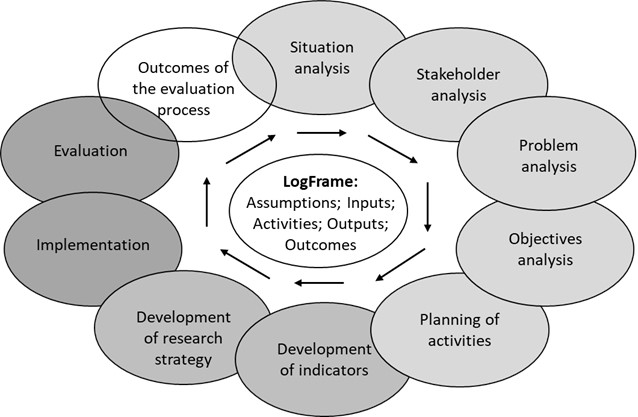Projects and project management for a sustainable social impact
SERIES ARTICLE
By Reinhard Wagner
Munich, Germany
INTRODUCTION
Projects and programs are time-bound undertakings intended to accomplish a specific objective, product, service, or activity. In project management, the focus in recent decades has been on delivering the scope of the project on time, on budget, and to the satisfaction of the customer. In this context, the fulfilment of the “iron triangle” of framework conditions is still the key measure of whether projects and programs are successful. The question of what projects are actually being done for, what expectations are associated with them in the short, medium and long term, or what the consequences and side effects are, has only been asked in a few cases.
Especially in the context of humanitarian development aid projects and programs, evaluation models have been developed that deal with the benefits, outcomes and social impact of these projects. Certainly, this is far more difficult to measure than deliverables and the adherence to the constraint of the “iron triangle,” but this is where we should really be looking out more closely. Project management, which dates primarily from the days of large engineering projects in the 1950s and is primarily focused to the execution, needs to pay much more attention to the preparation phase of projects and programs, as well as the phases of utilization after the deliverables have been delivered. This also fits well with the currently very popular thoughts on how to improve the sustainability of and through projects. This article aims to contribute to answering the question of what projects are really good for, what purpose and target groups are served, in what way the latter are involved in the process, and how the social impact of projects and programs can be determined.
WAYS TO PLAN, MEASURE AND CONTROL SOCIAL IMPACT OF PROJECTS
“Social impact is a theoretically rich construct. Not only can impact have positive and negative consequences, but there are virtually limitless ways in which those consequences can be brought about and in which those impacts are felt by any number of individuals, groups, entities, and so on” (Rawhouser et al., 2019: 95). Therefore, before starting projects and programs, a systematic analysis of the initial situation, the specific requirements and expectations of stakeholders should be carried out so that activities can then be consistently aligned with them. At the end of the project or, above all, of the program, it is a question of measuring what has been achieved, i.e. not only compliance with the triple constraints and delivery of the desired output, but above all the outcomes and the social impact, which can only be recognized sometime after completion. One approach for planning and evaluating the outcomes of projects and programs in the social sector is the Logical Framework Approach (LFA), which was already developed in the 1960s by the US Agency for International Development (USAID) and is nowadays widely used all over the world. Figure 1 shows is application in a holistic way from a situational analysis to an evaluation of the outcomes, which feeds back into future developments. Some of the connections were illustrated in my last contribution to this series (Wagner, 2022), referring to the example of Helvetas’ reconstruction program after the devastating earthquake in Nepal.

Figure 1: The LogFrame approach (Auriacombe, 2011: 47)
A model that has entered the literature as the ‘Theory of Change’ looks primarily at the outcomes of interventions in social systems (Mayne, 2015). Figure 2 on the next page shows the principle approach, from the activities – often carried out in the form of projects or programs – to the social impact in society or community.
More…
To read entire article, click here
Editor’s note: This series of articles is by Reinhard Wagner, PMWJ honorary global advisor and former Chair of IPMA. The series aims to position projects and project management in the context of society as social activities performed by and for people. The focus is on a sustainable social impact, which is to be achieved through the projects, and less on the management of the projects and the immediate deliverables. At the same time, projects are to be positioned as a means of self-realization through which people can jointly work for their communities, the environment or society as a whole. The series is aimed at the global community of project management practitioners, researchers, and those interested in learning about current developments in the field of project activities in society and how to achieve sustainable social impact through this engagement.
How to cite this article: Wagner, R. (2022). Measuring social impact of projects and programs; Series on projects and project management for a sustainable social impact, PM World Journal, Vol. XI, Issue VIII, August. Available online at https://pmworldlibrary.net/wp-content/uploads/2022/08/pmwj120-Aug2022-Wagner-measuring-social-impact-of-projects-and-programs-series5.pdf
About the Author

Reinhard Wagner
Munich, Germany
![]()
Reinhard Wagner has been active for more than 35 years in the field of project-related leadership, in such diverse sectors as Automotive, Engineering, and Consultancy, as well as various not-for-profit organizations. As Managing Director of Tiba Managementberatung GmbH, a leading PM Consultancy in Munich/Germany, he supports executives of industrial clients in transforming their companies towards a project-oriented, adaptive and sustainably successful organization. Reinhard Wagner has published 36 books as well as several hundred articles and blogposts in the field of project, program and project portfolio management. In more than 20 years of voluntary engagement he served the German Project Management Association (GPM) as well as the International Project Management Association (IPMA) in a range of leadership roles (including President and Chairman) and was granted for his international commitment with the Honorary Fellowship of IPMA and several of IPMA´s Member Associations. Reinhard is Senior Lecturer at the Alma Mater Europaea and is currently finishing his doctoral thesis on the topic of Project Society. He can be contacted via reinhard.wagner@tiba.de.
To view other works by Reinhard Wagner, visit his author showcase in the PM World Library at https://pmworldlibrary.net/authors/reinhard-wagner/










[…] – 5 Reasons To Incorporate Meaningful Social Impact Into Your Company Culture ( 2023-07-13 ) – Measuring social impact of projects and programs – PM World Journal ( 2022-08-08 ) – Council Post: The Business Benefits Of Corporate Social Responsibility Impact Assessments ( […]